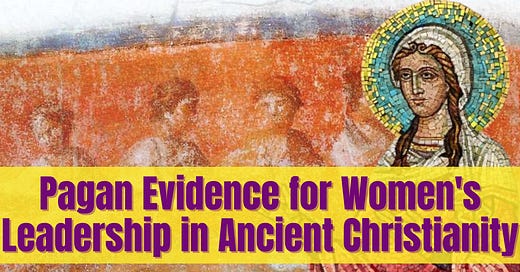Sometime around 111-13 AD, Pliny, the governor of Bithynia (north shore of modern-day Turkey) wrote a letter to the emperor Trajan about what to do with people denounced as “Christians.” Along the way, Pliny makes a fascinating statement about women church officers at one point.
They asserted, however, that the sum and substance of their fault or error had been that they were accustomed to meet on a fixed day before dawn and sing responsively a hymn to Christ as to a god, and to bind themselves by oath, not to some crime, but not to commit fraud, theft, or adultery, not falsify their trust, nor to refuse to return a trust when called upon to do so. When this was over, it was their custom to depart and to assemble again to partake of food--but ordinary and innocent food. Even this, they affirmed, they had ceased to do after my edict by which, in accordance with your instructions, I had forbidden political associations. Accordingly, I judged it all the more necessary to find out what the truth was by torturing two female slaves who were called ministrae. But I discovered nothing else but depraved, excessive superstition.
Now it is interesting that most translations of Pliny’s letters render ministrae as “deaconesses” in this context. But, at this point in time, ministrae was not a technical term for “deacon.” In fact, it is a rather ambiguous word as to what it could entail in terms of either the activity or authority that it implied in the churches of Bithynia. These female slaves might have been deacons, but they might also have been more!
As John Granger Cook writes:
Although Pliny may not have perceived the ministrae to be “priestesses” of the Christian group, there is ample evidence in the literary and inscriptional material surveyed above to believe that Pliny would have associated various cultic and priestly duties with the term ministra. The thesis that a ministra was clearly an individual with “a menial position in the church” (or one who exercised “menial cultic functions”) cannot be sustained. … Frequently in literary and inscriptional usage, various ministrae are mentioned in conjunction with priestly duties, altars, sacrificial tables, restoration of statues, erection of temples, sacred rites (sacri) and various other activities such as banking and even healing … The rich usage of ministra indicates that in Pliny’s perspective the women could have done everything from carrying incense boxes (if such were used in the liturgies of the community) to assisting the Christian priests in their liturgical duties—or even performing priestly functions.
We shouldn’t automatically suppose that these women were “deacons” and regard “deacon” as a lowly role! Read the story of Stephen-the-Deacon in Acts 7 and my article on In Praise of Deacons. I am all for Deacons! But, if these women were “ministers” in some broader sense, then that opens up the possibility that they performed Christian services and held Christian offices in some elevated sense.
Let’s explore that now!











